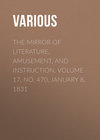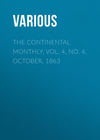Buch lesen: «The Mirror of Literature, Amusement, and Instruction. Volume 17, No. 470, January 8, 1831», Seite 2
CLARENCE AND ITS ROYAL DUKES
(To the Editor.)
Clarentia, or Clarence, now Clare, a town in Suffolk, seated on a creek of the river Stour, is of more antiquity than beauty; but has long been celebrated for men of great fame, who have borne the titles of earls and dukes. It has the remains of a noble castle, of great strength and considerable extent and fortification (perhaps some of your readers could favour you with a drawing and history of it); and ruins of a collegiate church. It had once a monastery of canons, of the order of St. Augustine, or of St. Benedict, founded in the year 1248, by Richard Clare, Earl of Gloucester. This house was a cell to the Abbey of Becaherliven, in Normandy, but was made indigenous by King Henry II., who gave it to the Abbey of St. Peter, at Westminster. In after time, King John changed it into a college of a dean and secular canons. At the suppression, its revenues were 324l. a year.
Seated on the banks of Stour river is a priory of the Benedictine order, translated thither from the castle, by Richard De Tonebridge, Earl of Clare, about the year 1315. Edmund Mortimer, Earl of March, converted it into a collegiate church. Elizabeth, the wife of Lionell, Duke of Clarence, was buried in the chancel of this priory, 1363; as was also the duke.
The first duke was the third son of King Edward III. He created his third son, Lionell of Antwerp, Duke of Clarence, in 1362. His first wife was Elizabeth of Clare, daughter of William De Burgh, Earl of Ulster; she died in 1363. His second wife was Violante, daughter of the Duke of Milan. He died in Italy, 1370.
Clarencieux, the second king-at-arms, so called by Lionell, who first held it. King Henry IV. created his second son, Thomas of Lancaster, to the earldom of Albemarle and duchy of Clarence. He was slain in Anjou, in 1421.
The third duke was the second son of Richard of Plantagenet, Duke of York, George Duke of Clarence, in Suffolk. He was accused of high treason, and was secretly suffocated in a butt of Malmsley, or sack wine, in a place called Bowyer Tower, in the Tower of London, 1478, by order of his brother, King Edward IV.
The fourth duke. There was an interregnum of 311 years before another Duke of Clarence. George III. created his third son, William Henry, to the duchy of Clarence, August 16, 1789. The only Duke of Clarence who ever was raised to the throne is King William IV. of England.
CARACTACUS
SPIRIT OF THE Public Journals
SIR WALTER SCOTT
(From the first of "Living Literary Characters," in the New Monthly Magazine.)
It would be superfluous to continue the list of his prose works: they are numerous; but they are in all people's hands, and censure or praise would come equally late. He has triumphed over every difficulty of subject, place, or time—exhibited characters humble and high, cowardly and brave, selfish and generous, vulgar and polished, and is at home in them all. I was present one evening, when Coleridge, in a long and eloquent harangue, accused the author of Waverley of treason against Nature, in not drawing his characters after the fashion of Shakspeare, but in a manner of his own. This, without being meant, was the highest praise Scott could well receive. Perhaps the finest compliment ever paid him, was at the time of the late coronation, I think. The streets were crowded so densely, that he could not make his way from Charing Cross down to Rose's, in Abingdon-street, though he elbowed ever so stoutly. He applied for help to a sergeant of the Scotch Greys, whose regiment lined the streets. "Countryman," said the soldier, "I am sorry I cannot help you," and made no exertion. Scott whispered his name—the blood rushed to the soldier's brow—he raised his bridle-hand, and exclaimed, "Then, by G-d, sir, you shall go down—Corporal Gordon, here—see this gentleman safely to Abingdon-street, come what will!" It is needless to say how well the order was obeyed.
I have related how I travelled to Edinburgh to see Scott, and how curiously my wishes were fulfilled; years rolled on, and when he came to London to be knighted, I was not so undistinguished as to be unknown to him by name, or to be thought unworthy of his acquaintance. I was given to understand, from what his own Ailie Gourlay calls a sure hand, that a call from me was expected, and that I would be well received. I went to his lodgings, in Piccadilly, with much of the same palpitation of heart which Boswell experienced when introduced to Johnson. I was welcomed with both hands, and such kind, and complimentary words, that confusion and fear alike forsook me. When I saw him in Edinburgh, he was in the very pith and flush of life—even in my opinion a thought more fat than bard beseems; when I looked on him now, thirteen years had not passed over him and left no mark behind: his hair was growing thin and grey; the stamp of years and study was on his brow: he told me he had suffered much lately from ill-health, and that he once doubted of recovery. His eldest son, a tall, handsome youth—now a major in the army—was with him. From that time, till he left London, I was frequently in his company. He spoke of my pursuits and prospects in life with interest and with feeling—of my little attempts in verse and prose with a knowledge that he had read them carefully—offered to help me to such information as I should require, and even mentioned a subject in which he thought I could appear to advantage. "If you try your hand on a story," he observed, "I would advise you to prepare a kind of skeleton, and when you have pleased yourself with the line of narrative, you may then leisurely clothe it with flesh and blood." Some years afterwards, I reminded him of this advice. "Did you follow it?" he inquired. "I tried," I said; "but I had not gone far on the road till some confounded Will-o-wisp came in and dazzled my sight, so that I deviated from the path, and never found it again."—"It is the same way with myself," said he, smiling; "I form my plan, and then I deviate."—"Ay, ay," I replied, "I understand—we both deviate– but you deviate into excellence, and I into absurdity."
I have seen many distinguished poets, Burns, Byron, Southey, Wordsworth, Campbell, Rogers, Wilson, Crabbe, and Coleridge; but, with the exception of Burns, Scott, for personal vigour, surpasses them all. Burns was, indeed, a powerful man, and Wilson is celebrated for feats of strength and agility; I think, however, the stalworth frame, the long nervous arms, and well-knit joints of Scott, are worthy of the best days of the Border, and would have gained him distinction at the foray which followed the feast of spurs. On one occasion he talked of his ancestry, Sir Thomas Lawrence, I think, was present. One of his forefathers, if my memory is just, sided with the Parliament in the Civil War, and the family estate suffered curtailment in consequence. To make amends, however, his son, resolving not to commit the error of his father, joined the Pretender, and with his brother was engaged in that unfortunate adventure which ended in a skirmish and captivity at Preston, in 1715. It was the fashion of those times for all persons of the rank of gentlemen to wear scarlet waistcoats—a ball had struck one of the brothers, and carried a part of this dress into his body; it was also the practice to strip the captives. Thus wounded, and nearly naked, having only a shirt on and an old sack about him, the ancestor of the great poet was sitting along with his brother and a hundred and fifty unfortunate gentlemen, in a granary at Preston. The wounded man fell sick, as the story goes, and vomited the scarlet which the ball had forced into the wound. "L–d, Wattie!" cried his brother, "if you have got a wardrobe in your wame, I wish you would bring me a pair of breeks, for I have meikle need of them." The wound healed; I know not whether he was one of those fortunate men who mastered the guard at Newgate, and escaped to the continent.
The mystery which hung so long over the authorship of the Waverley Novels, was cleared up by a misfortune which all the world deplores, and which would have crushed any other spirit save that of Scott. This stroke of evil fortune did not, perhaps, come quite unexpected; it was, however, unavoidable, and it arose from no mismanagement or miscalculation of his own, unless I may consider—which I do not—his embarking in the hazards of a printing-house, a piece of miscalculation. It is said, that he received warnings: the paper of Constable, the bookseller, or, to speak plainer, long money-bills were much in circulation: one of them, for a large sum, made its appearance in the Bank of Scotland, with Scott's name upon it, and a secretary sent for Sir Walter. "Do you know," said he, "that Constable has many such bills abroad—Sir Walter, I warn you."—"Well," answered Sir Walter, "it is, perhaps, as you say, and I thank you; but," raising his voice, "Archie Constable was a good friend to me when friends were rarer than now, and I will not see him balked for the sake of a few thousand pounds." The amount of the sum for which Scott, on the failure of Constable, became responsible, I have heard various accounts of—varying from fifty to seventy thousand pounds. Some generous and wealthy person sent him a blank check, properly signed, upon the bank, desiring him to fill in the sum, and relieve himself; but he returned it, with proper acknowledgments. He took, as it were, the debt upon himself, as a loan, the whole payable, with interest, in ten years; and to work he went, with head, and heart, and hand, to amend his broken fortunes. I had several letters from him during these disastrous days: the language was cheerful, and there were no allusions to what had happened. It is true, there was no occasion for him to mention these occurrences to me: all that he said about them was—"I miss my daughter, Mrs. Lockhart, who used to sing to me; I have some need of her now." No general, after a bloody and disastrous battle, ever set about preparing himself for a more successful contest than did this distinguished man. Work succeeded work with unheard of rapidity; the chief of which was, "The Life of Napoleon Bonaparte," in nine volumes—a production of singular power, and an almost perfect work, with the exception of the parts which treat of the French Revolution, and the captivity of the great prisoner. I had the curiosity, on seeing one of the reviews praising Hazlitt's description of the Battle of the Pyramid's, to turn to the account of Scott. I need not say which was best: Scott's was like the sounding of a trumpet. The present cheap and truly elegant edition of the works of the author of "Waverley" has, with its deservedly unrivalled sale, relieved the poet from his difficulties, and the cloud which hung so long over the towers of Abbotsford has given place to sunshine.
Of Abbotsford itself, the best description ever given, at least the briefest, was "A Romance in stone and lime." It would require a volume to describe all the curiosities, ancient and modern, living and dead, which are here gathered together;—I say living, because a menagerie might be formed out of birds and beasts, sent as presents from distant lands. A friend told me he was at Abbotsford one evening, when a servant announced, "A present from"—I forget what chieftain in the North.—"Bring it in," said the poet. The sound of strange feet were soon heard, and in came two beautiful Shetland ponies, with long manes and uncut tails, and so small that they might have been sent to Elfland, to the Queen of the Fairies herself. One poor Scotsman, to show his gratitude for some kindness Scott, as sheriff, had shown him, sent two kangaroos from New Holland; and Washington Irving lately told me, that some Spaniard or other, having caught two young wild Andalusian boars, consulted him how he might have them sent to the author of "The Vision of Don Roderick."
This distinguished poet and novelist is now some sixty years old—hale, fresh, and vigorous, with his imagination as bright, and his conceptions as clear and graphic, as ever. I have now before me a dozen or fifteen volumes of his poetry, including his latest—"Halidon Hill"—one of the most heroically-touching poems of modern times—and somewhere about eighty volumes of his prose: his letters, were they collected, would amount to fifty volumes more. Some authors, though not in this land, have been even more prolific; but their progeny were ill-formed at their birth, and could never walk alone; whereas the mental offspring of our illustrious countryman came healthy and vigorous into the world, and promise long to continue. To vary the metaphor—the tree of some other men's fancy bears fruit at the rate of a pint of apples to a peck of crabs; whereas the tree of the great magician bears the sweetest fruit—large and red-cheeked—fair to look upon, and right pleasant to the taste. I shall conclude with the words of Sir Walter, which no man can contradict, and which many can attest: "I never refused a literary person of merit such services in smoothing his way to the public as were in my power; and I had the advantage—rather an uncommon one with our irritable race—to enjoy general favour, without incurring permanent ill-will, so far as is known to me, among any of my contemporaries."




















